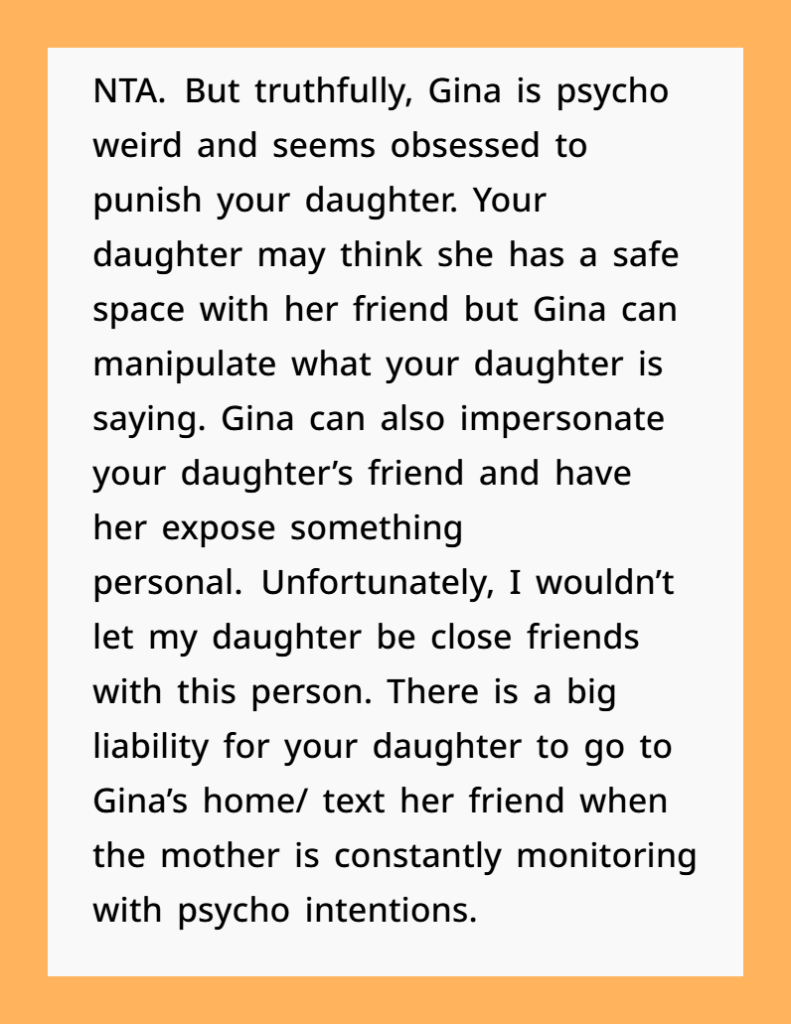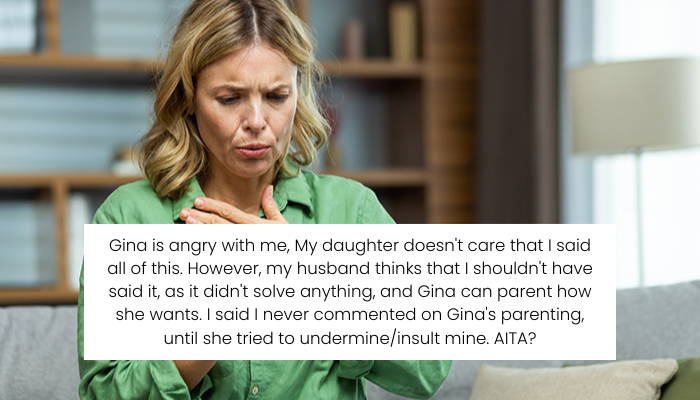AITA for Backing My Teen Daughter After She Called Her Friend’s Mom a ‘Weirdo’?
In a digital age where parenting styles collide with adolescent independence, one mother finds herself caught between supporting her 14-year-old daughter and confronting a boundary-crossing parent. The conflict centers around a strict mother named Gina, who frequently monitors and responds to her daughter Chloe’s messages—even replying to Chloe’s friends through her phone. When Gina abruptly responded to a message from the original poster’s daughter, tensions escalated. The teen, feeling disrespected, clapped back with a comment calling Gina a “weirdo” for impersonating her daughter online.
The situation intensified when Gina called the mother, demanding disciplinary action and asserting that the teen’s behavior was disrespectful toward an adult. But the mother, after reviewing the messages and discussing them calmly with her daughter, stood firm in her stance—acknowledging the comment was unkind, but ultimately defending her daughter’s right to express discomfort at the invasive communication. Now facing criticism from her husband and lingering resentment from Gina, the mother questions whether supporting her daughter so openly made her the antagonist—or simply a parent prioritizing emotional intelligence over authoritarian discipline.
This mom is known for checking her daughter’s phone and responding to texts

When she got called a “weirdo” by one of her teen’s friends, all hell broke loose

















Balancing Parental Oversight and Teen Privacy in Digital Communication
In the digital era, the boundary between parental supervision and a teenager’s right to privacy has become increasingly complex. The scenario involving a 14-year-old girl, her friend Chloe, and Chloe’s mother, Gina, exemplifies this delicate balance. Gina’s practice of monitoring and intervening in her daughter’s text conversations raises critical questions about the extent of parental control and the preservation of adolescent privacy.

Understanding the Legal Framework
Legally, parents possess considerable authority over their minor children’s activities, including digital communications. In the United States, for instance, minors do not have the same privacy rights as adults within their homes, granting parents the right to monitor, restrict, or control their child’s phone usage. However, this authority is not without limitations. Courts have recognized that while parental authority is broad, it is curtailed when actions harm the child. The child’s maturity and capacity are also factors; older minors may be accorded greater consideration regarding their privacy.
Psychological Implications of Over-Monitoring
Excessive parental monitoring can have unintended psychological consequences. It may hinder the development of self-regulation skills and strain parent-child relationships. Studies suggest that overly restrictive control can impede a child’s ability to learn self-governing skills and may restrict open communication between parent and child. Furthermore, adolescents require a degree of privacy to cultivate independence and trust. Over-monitoring can lead to feelings of mistrust and may provoke rebellious behavior.
Ethical Considerations and Best Practices
Ethically, the balance between ensuring safety and respecting privacy is delicate. While parents have a duty to protect their children, respecting their autonomy is equally crucial. Open communication is paramount. Engaging in discussions about online safety, setting clear expectations, and explaining the reasons for any monitoring can foster mutual understanding. Collaborative approaches, where parents and teens work together to manage online safety, have been suggested as beneficial. However, challenges such as power imbalances can make implementation difficult.
Case Studies and Legal Precedents
Several legal cases highlight the complexities of parental monitoring. In Robbins v. Lower Merion School District, a school district faced legal action for remotely activating webcams on school-issued laptops to spy on students at home, leading to a settlement of $610,000. This case underscores the legal ramifications of unauthorized surveillance and the importance of respecting privacy boundaries.
In another instance, the Constitutional Court of Colombia ruled in Ruling T-260/12 that a father’s creation of a Facebook account for his 4-year-old daughter without her consent violated her rights to privacy and honor, leading to the account’s closure. This case emphasizes the necessity of obtaining consent and considering the child’s autonomy in digital spaces.
Some people needed more info before they could come to a conclusion about the situation







The intersection of parental rights and adolescent privacy in digital communication is multifaceted. While parents have a legitimate interest in safeguarding their children, it is imperative to balance this with respect for their privacy and autonomy. Open dialogue, clear boundaries, and mutual trust are essential components in navigating this complex terrain. By fostering an environment of understanding and respect, parents can guide their children toward responsible digital citizenship without encroaching on their fundamental rights.

